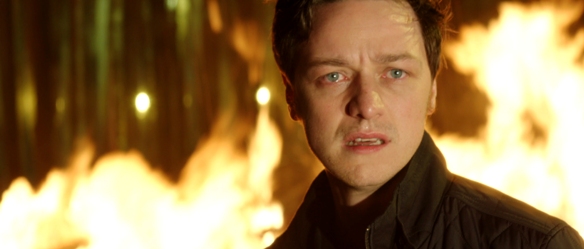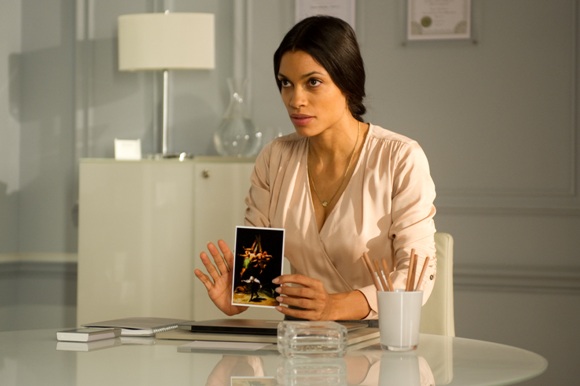
Let’s start with the positives. Trance, the new Danny Boyle film, embraces a distinctly unsettling ambiance. In some respects, it strongly recalls Shallow Grave, his first big hit from way back in ’94, in this respect: unconventionally framed camera shots, a washed and essentially anonymous palette (Shallow Grave was more about shadows), a juddering juxtaposition of scenes that keeps the the viewer on the back foot constantly.
It’s a film about crime and amnesia, so the stylistic tics are quite in tune. Simon (James McAvoy) is an art auctioneer whose bad habits have led him to very bad company indeed. Franck (Vincent Cassel) has his eye on a painting, Goya’s Three Witches, about to be flogged by Simon’s auction house. Simon’s inside knowledge of the security procedures let Franck side-step the tiresome business of actually bidding for the painting, rather relying on the tried and tested method of threats of violence. But there is no honour amongst thieves, whatever one might say to the contrary. Simon tries to double-cross his comrades in arms, and gets a nasty smack in the head for his troubles.
Things might have ended here, if it weren’t for one important detail: Franck and his henchmen get an empty frame instead of the £27m masterpiece, and Simon – who has lost his memory – has no idea what he did with the painting. Necessity makes for uneasy bedfellows: since brute force doesn’t succeed in liberating the painting’s location from Simon’s unconscious, a more subtle approach is needed.
It’s an intriguing premise for a film, but one that remains largely unrealised, mainly because Doyle mixes up the medium and the message, so to speak. Crime and greed are constants that cut across nationality, ethnicity and culture, and in this sense the stylistic sensibilities that dominate Trance translate well. Up to a point. Trance is set in London, but this could really be anywhere. I think it’s a good thing that Boyle doesn’t make very much of location (anonymity aside), because Franck’s solution for Simon’s forgetfulness is to employ the services of a hypnotherapist. Which, I think, is a distinctly un-British resolution for an old-fashioned crime and double-cross scenario.

Let’s stick with the improbabilities. On the one hand, Elizabeth Banks (Rosario Dawson) has the cross-Atlantic credentials that make that make her role as designated hypnotherapist just about plausible. (I’m not actually saying that hypnotherapy is tree-hugging hippy crap, but the nuts and bolts of her craft are so transiently sketched that it does feel that way sometimes.) Less so is the manner in which she inveigles herself into proceedings, a combination of guile, greed and what to me seems like playing on the gullibility of men trained to think with their groins first and their brains later. Elizabeth may just be able to coax the secrets out of Simon, but there’s no guarantee that he’d live to enjoy the fruits of his efforts. Concurrently, there is a curious and unexplained bond between patient and practitioner, hinting that things are not quite what they seem to be. Matters shape into complicated three-hander, Elizabeth and Franck and James playing one off against the other, but none of the three quite clear about the cards they’re holding themselves. It seems…
Threads of memory become entangled, and it is never quite clear what is real and what is not. It’s ambitious but dreadfully untidy, and even if the story was less of a chaotic mess than it ends up this would not have been one of Boyle’s finer efforts. Loss of memory is conceit that has been played on quite a few times in the past – most notably Christopher Nolan’s exceptional Memento – but Boyle (working on a script originally written by Joe Ahearne, and doctored by Byole’s long-term writing collaborator John Hodges) seems to forget that for films like this to work, there needs to be a clean narrative line that runs down the middle like a spine. That is precisely the reason why Shallow Grave worked so well, and this not at all. As it is, the story is too fractured and wanders up too many blind alleys to keep us convinced.
It does entertain though, in a superficial enough way. The acting is on the whole, perfunctory; no fault of McAvoy, Cassel and co, since they aren’t given very much to work with. I suppose the kindest thing one can say is that it entertains in a transitory enough manner. You’d have probably forgotten it by the time you get home.





